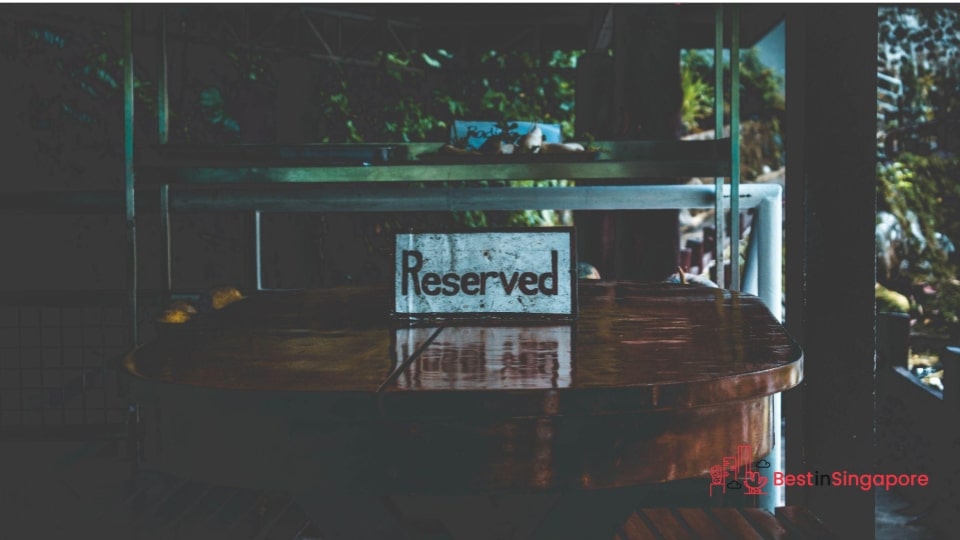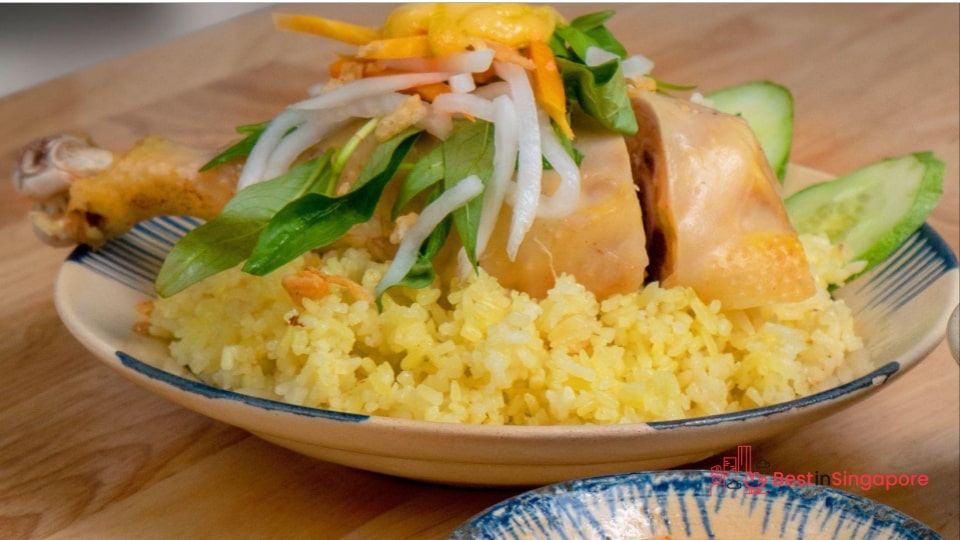20 Singaporean Slang Words to Know for Work, Travel & More
New in town? English is widely spoken in Singapore, but there might still be some expressions that you can’t quite understand yet.
That’s why today’s post features some Singlish and Singaporean slang for work, travel, food, and relationships.
Can or not? Can lah!
Singaporean Slang for Work
In this section, you’ll learn some common Singapore slang words you’ll likely hear at work or in office spaces. Some are uttered sarcastically, some are passive-aggressive, while others are expressions of relief.
1. Rabak

What it means: An adjective similar to “messed up”
When to use it: When a situation becomes chaotic
Common examples: “Boss doesn’t like my report and returned it. Now my schedule is rabak!”
“Your cousin was so rabak at last night’s party. Is she okay?”
When Singaporeans get stressed at work, you’d likely hear the word rabak thrown around in exasperation and anger. It describes a situation that is chaotic or out of control, though not necessarily due to the fault of anyone.
A lot of rabak situations could happen out of the blue, like when you’re walking and trip over something. It could also be used to describe a negative person or someone who always seems to mess things up.
Surprisingly, rabak also attempts to explain the behaviour of someone who’s the life of the party. And yes, there’s an element of being out of control in that case, too.
2. OTOT

What it means: “Own time, own target”
When to use it: When a task isn’t urgent and you’re allowed to finish it at your own pace
Common examples: “There’s no definite deadline for this, so go OTOT.”
“Freelancing has allowed me to go on my OTOT for projects!”
There are many reasons why Singaporeans work so hard, but we do know how to take it slow once in a while. In work situations, it’s when we’re allowed to do things on our OTOT (own time, own target).
OTOT is usually in the realm of freelance jobs, though it often describes wiggle room rather than a permanent state of not having a deadline. And being Singaporeans, we’re pretty mindful of getting a task done on time.
So just think of OTOT as a way to take some of the stress of an end goal away, and be encouraged to do more work-life balance in the process.
3. Sabo

What it means: An abbreviation of “sabotage”
When to use it: When someone from the workplace sets someone else up to be inconvenienced
Common examples: “I was supposed to OTOT but this newbie manager sabo me with an urgent task!”
“Got sabo again to change the printer ink! Why me all the time?!”
To minimize burnout at work, you’ll need to efficiently communicate with your colleagues and higher-ups. But sometimes, a sabo situation happens and you can’t help but become frustrated and angry.
It’s a shortened term for sabotage, and the intentions behind a sabo event are often deliberate. That’s what makes it extra-triggering and rage-inducing for a lot of office workers.
Sabo could be a power move on someone’s part or the result of a lazy person wanting to shirk their responsibilities by having someone else do it. Either way, it’s a nasty phenomenon.
4. Pang Gang

What it means: You’re done working for the day and you’re happy
When to use it: To celebrate the end of another harrowing workday/week
Common example: “I’m done with that report! Pang gang and see you Monday!” (Throws documents in the air)
Pang gang (or pang kang) is an expression of utter relief and freedom—at least until the following day or week’s new work schedule. It’s Hokkien for “ending work” and is considered office slang through and through.
It’s uttered or shouted when you’re ready to clock out of the office and hit your fave cocktail bars. Think of it as a mini-celebration because you’re finally done with all your tasks for the day.
So the next time 5 o’clock rolls around, don’t be surprised when someone shouts “Pang gang lo!” from the next cubicle.
5. Eye Power

What it means: Someone who stands around watching other people do actual work
When to use it: When you want to point out that someone’s being useless at work and you need them to lend a helping hand
Common examples: “I managed to meet our deadline by myself, so thank you for your eye power!” (Sarcastically)
“Aside from eye power, do you have anything concrete to contribute?”
Teamwork makes the dream work—but not when everyone else is picking up the slack for one person. This is when the term “eye power” can be applied.
It’s also an expression for when you want other people to pitch in during a meeting or brainstorming session. You can direct it to somebody who just stands around or watches and doesn’t participate or contribute anything.
It’s passive-aggressive slang that’s unfortunately been necessary to get others to be team players. But hey, if it works, use it, right?
Singaporean Slang For Travel
Aside from packing essentials in your travel backpack, you’ll also need to know how to communicate effectively with Singaporeans and other people in the country.
We’ve already posted 50 helpful phrases to get around in Singapore, but we figured a few more handy ones won’t hurt.
6. Auntie, Uncle

What it means: A greeting of respect to someone older
When to use it: When ordering from a hawker stall or meeting someone’s parents
Common examples: “One order of bak kut teh, Auntie!”
“So happy to meet you, Uncle! Your son is a good friend from school.”
There are different ways to address the elderly in Singapore, but “auntie” and “uncle” are some of the most common ones. In fact, you can hear it practically everywhere, from private homes to hawker centres.
It’s to show deference and respect to someone older. And no, you don’t need to be a blood relation with them to do so.
The funny thing is, there’s been a lot of debate about how old someone should be to be called auntie or uncle (so some nuance is in order)! But rest assured you can always address an older hawker vendor or service provider with these terms.
7. What time already?

What it means: Something you say to someone who’s always late
When to use it: To express exasperation at perennial tardiness
Common examples: “Be there in ten minutes!” “What time already? The meeting is over!”
“Oh, you missed your flight? What time already?”
If you know certain people who ignore their watches and alarm clocks and are always late for things, then this expression is perfect for them. It might take something drastic to get them to arrive on time, but until then, this sarcastic expression could suffice.
“Already” places emphasis on something that’s already passed. This means whatever the excuse is for being late may be, it won’t matter anymore.
It’s not even a question but an outright affirmation of someone’s perennial tardiness. So go ahead and put on an exasperated tone while saying “What time already?” if you must.
8. Tompang

What it means: Verb meaning to hitch a ride with someone
When to use it: When you’re stranded and don’t have any means of going home on your own
Common examples: “Woke up too late! Can I tompang with you to work?”
“This neighbour always tompang with me like I’m his driver!”
Cars in Singapore are expensive, so it’s only logical to carpool or hitch with other people to go from point A to point B. Tompang is a Singapore slang word that succinctly captures this circumstance.
A tompang situation can either be arranged or a spontaneous one. Its effectivity will depend on whether the tompang-seeker knows how to show their gratitude or if they’ve become a pesky consequence of everyday commute.
Still, tompang is a useful word to use during travels, especially if you find yourself stranded or lost somewhere in Singapore. The secret is in not wearing out your welcome.
9. Lepak

What it means: The act of chillaxing
When to use it: When you want to go on a break from work (or life in general)
Common examples: “I want to spend the entire week and just lepak without thinking about work!”
“What are your weekend plans?” “Nothing, just lepak all day.”
Yes, Singaporeans may be competitive, but we also know how to relax and unwind. And it’s not just within the confines of yoga classes, either.
This act of chillaxing is referred to as “lepak.” It’s all about taking it easy and not allowing stressful things to get in the way of self-care.
So if you see an overworked colleague either at the beach or just sitting on a park bench somewhere, they’re probably in the middle of their lepak session. Please don’t come over and bother them with work matters.
10. Jalan Jalan

What it means: Verb meaning to stroll
When to use it: When you want to walk aimlessly without a care in the world
Common example: “I’m so stuffed with laksa that I need to jalan jalan all over Joo Chiat for an hour.”
Jalan jalan is the need to walk it off, the more aimlessly, the better. It’s not like a deliberate trek on a hiking trail but something more casual.
You can jalan jalan after eating a heavy meal or even when you just want to clear your head. Luckily, Singapore is extremely walkable and even features several natural parks you can visit and explore for a bit.
The quality that best separates a jalan jalan from any other kind of walking would be that it’s a carefree one. Singaporeans are known to be the fastest pedestrians in the world, so the person’s pace alone can tip you off.
Singaporean Slang for Eating (and Other Food Situations)
It’s hard not to associate travelling to Singapore with eating a lot of delicious meals. The country’s hawker culture is on the UNESCO heritage list, after all.
This particular section shows Singaporean slang words and phrases that have to do with eating. So enjoy Peranakan food and other types of cuisine while being mindful of the habits and expressions that come with them.
11. Chope

What it means: To reserve a seat at an eatery before you order food
When to use it: When a hawker centre or coffee shop is full, you can place a tissue packet, umbrella, or other non-valuables to mark a table as taken.
Common example: “There’s an empty table. Quick! Chope it with your umbrella!”
It’s an unspoken rule in Singapore that reservations in casual coffee shops and hawker centres are to be done by chope. The act of chope (or choping) involves placing a ubiquitous item like a tissue packet to mark a table as reserved.
Fine dining places have strict reservation systems, but the chope method is good enough for (often-crowded) eateries. It’s particularly effective in places with fast turnovers like hawker stalls.
But be mindful about your chope practices since nearly everyone in Singapore is assumed to do it, too. Make sure your informal reservation won’t go past 10 to 15 minutes to be considerate of other diners.
12. Atas

What it means: A Malay derivative for “up” to denote upper-classness
When to use it: To describe something fancy or high-class
Common examples: “You made a reservation at that restaurant? Too atas for me!”
“Crazy Rich Asians is full of atas moments.”
Atas can describe anything from a fancy restaurant to someone dripping with jewellery even when they’re wearing casual clothes. It’s derived from the Malay word for “upstairs,” so it denotes something that’s hard to reach.
It’s Singaporean slang that can be used in plenty of social situations. It could be an atas situation when someone brags about their designer items too much or when you experience something luxurious for the first time and feel out of place.
Still, atas isn’t meant to be entirely negative. A lot of Singaporeans consider it an aspirational state of being, too.
13. Shiok

What it means: An expression of great happiness or delight
When to use it: When a plate of mouthwatering food is placed in front of you
Common examples: “Our chilli crabs are shiok! Die die must try!”
“Shiok! The office is declaring a long weekend!”
There are many instances to utter “shiok” in utter delight while in Singapore. It could be from getting the best brunch or when you hear some good news you’ve been waiting for.
It can denote either emotional or physical pleasure. The most common occurrence would be when you taste, eat, or drink something delicious, which is why it’s often heard in hawker centres and eateries.
But a shiok experience can also be had in other situations, like getting an unexpected bonus at work (and other favourable instances).
14. Dabao

What it means: Takeaway food
When to use it: When you’re deciding where to have lunch with your workmates but lose so much time choosing that you get your food to go
Common examples: “I’d like a burger and fries meal, dabao please!”
“This deadline can’t wait so I have to dabao my brunch today.”
Dabao (or tapao) is a Mandarin-derived term that means eating takeaway, usually at work because you can’t step out or stop a task to have lunch.
The term is similar to “al desko” (a mash-up of al fresco and desk). It can also be applied to food delivery services because it offers the same kind of convenience as a takeaway.
In more risque circumstances, dabao can also mean taking someone home after a date. But be careful saying it around dating couples, as it can cause misunderstanding of intentions.
15. Makan

What it means: Malay for “to eat”
When to use it: Typically during lunchtime
Common examples: “Still working? It’s makan time 20 minutes ago!”
“You makan already?”
Another food slang, makan, is usually heard when people are ready to devour their lunches (though not necessarily at their work desks). It’s Malay for “to eat” and it can be an invitation, command, or something else.
It’s arguably one of the most familiar Singaporean slang words given that food is part and parcel of living and working here. And it’s typically used at lunchtime, too.
It’s also one of the most endearing ways to greet someone in Singapore. Makan can roughly translate into “Have you eaten yet?” even among people meeting for the first time.
Singaporean Slang for Relationships
There are Singlish expressions for practically everything. It only makes sense to have Singaporean slangs for relationships, whether they’re platonic or romantic.
16. Last Warning

What it means: Something you tell someone when you’re at the end of your rope
When to use it: Any situation that can quickly turn ugly if the other person doesn’t stop being annoying
Common example: “I met this nice girl, and I want to tell her my knock-knock jokes.” “Do not do that! LAST WARNING!”
Do you have that friend whom you care about but also want to use for kickboxing practice? Instead of resorting to violence, you can turn to this tried-and-tested Singapore slang.
The words “last warning” might be able to prevent you from going prematurely bald when you want to tear your hair in frustration.
Think of it as a friendlier preemptive strike when you start feeling like your friend will ruin your day with a bad joke, bad manners, a bad habit, or other bad things. And when uttered in the right tone, it can save your friendship with a pesky but lovable pal.
17. Pai Seh

What it means: An embarrassed expression that’s also a way of apologising
When to use it: When you need to denote how ashamed you are of a situation
Common examples: “Pai seh, I went to work with two different shoes on.”
“Pai seh teacher for being late to class again because of my bad tummy.”
Pai seh is a way of saying sorry for doing something you’re ashamed of. Or it could be another way of saying “excuse me” especially when you’re lacking confidence.
The term is quite versatile but is often used to denote embarrassment or shyness in all sorts of situations. An example is when you forgot to brush your teeth and suspect you have bad breath while going on a blind date.
It’s okay to be in a pai seh situation once in a while, but it’s even better to be more assertive and stop apologising or feeling embarrassed for every small thing.
18. Come I clap for you

What it means: A sarcastic response to a situation that may or may not merit applause or praise
When to use it: When you don’t feel genuinely happy for someone
Common examples: “Oh, you managed to get to work on time? Come I clap for you.”
“Come I clap for you because you don’t know the difference between ‘there’ and ‘their.’”
Need to be sarcastic and passive-aggressive at the same time? There’s a Singaporean slang that’s suitable for those moments, and I personally find it hilarious.
“Come I clap for you” has that Singlish phrase quality that uses English words but in a distinctively local tone that can confuse anyone nicely. It’s even more effective when used with an exaggerated gesture of applause.
So if you’re not feeling particularly festive over someone’s achievement (or lack thereof), try this slang. It might make you feel better even for a bit.
19. Eee-yer

What it means: An expression of disgust
When to use it: When you encounter something (or someone) you find repugnant
Common examples: “Eee-yer, why do you have to pick your nose in front of me??!”
“This restaurant tried to serve me mouldy cheesecake. Eee-yer, I want to speak to the manager!”
Decorum is a must in most social situations. But what about those times when something truly disgusting appears in front of you?
You go “eee-yer,” that’s what. It’s a word that perfectly captures the revulsion you feel when confronted with what puts you off, whether it’s an oozing pimple on a nose or someone who doesn’t know what good hygiene is.
But do take care to use eee-yer only around people you know can take it like a champ. Otherwise, when you say that to people you barely know, you’ll likely come off as a bully or snob (or both).
20. Paktor

What it means: Going out on a date with someone
When to use it: When you want to know how someone’s date went
Common examples: “Is it true you paktor with the boss? Spill the beans!”
“How did your paktor go last night?”
Yes, there’s Singapore slang for going on a date, and it’s paktor. It’s typically used to tease someone about their crush and how they should go on a date with them already.
It’s a relatively new relationship slang, so it might not be as widely used as the others in this guide. Still, it’s a pretty cute word that even made it as a name for a local dating app!
So if you want to get closer to someone you like, ask them to paktor with you and see if sparks fly.


